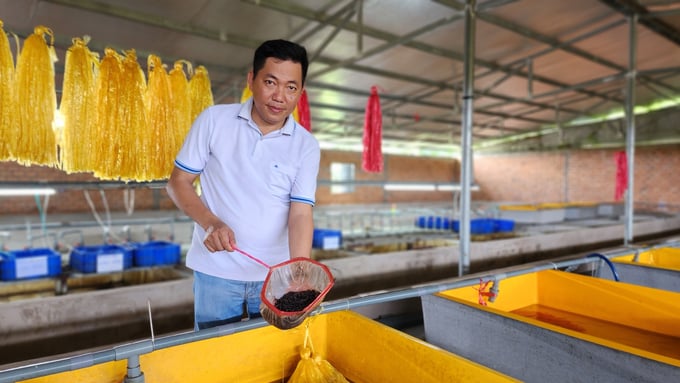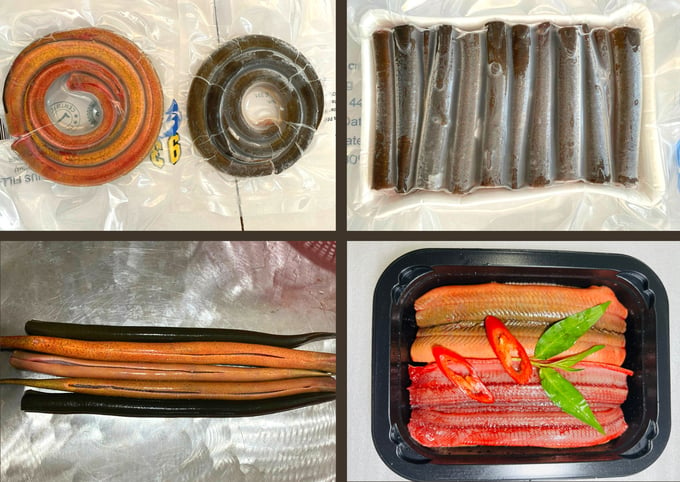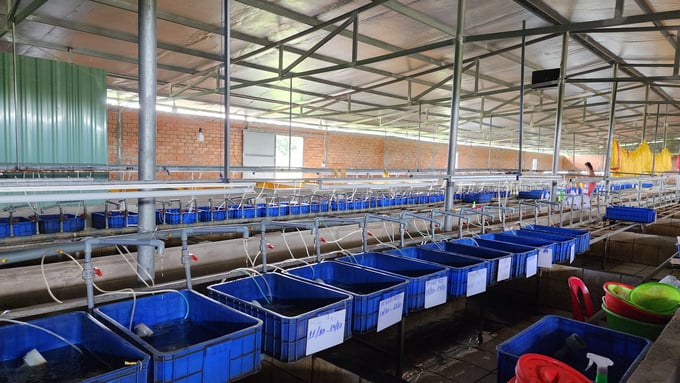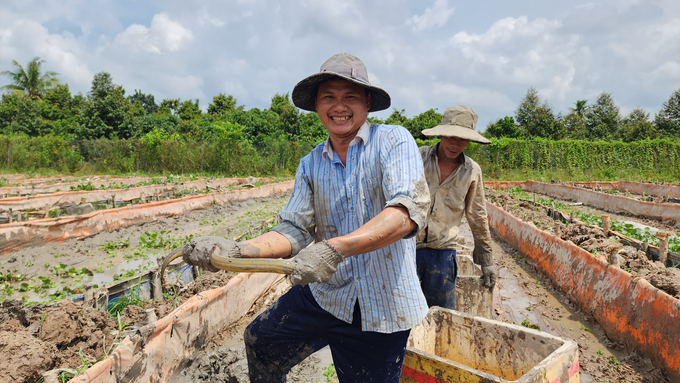May 30, 2025 | 19:46 GMT +7
May 30, 2025 | 19:46 GMT +7
Hotline: 0913.378.918
May 30, 2025 | 19:46 GMT +7
Hotline: 0913.378.918
Raising eel without mud has become a relatively developed economic model in some provinces of the Mekong Delta for the past few years. According to farmers, eel is an easy fish to raise because it can adapt to many water sources, moreover, the farming area does not need to be large, only about 6 square meters, farmers can harvest from 500-700kg of eel meat, which is very suitable. suitable for agricultural labor.

Mr. Nguyen Thanh Tan, Director of Thanh Tan Artificial Eel Farm, participates in building an eel export chain in early 2023. Photo: Kim Anh.
In terms of nutritional value, eel is considered a nutrient-rich food. As a result, the market for eels has developed positively and steadily. After realizing its potential, Mr. Nguyen Thanh Tan in Binh Hoa 1 hamlet, Binh Hoa Phuoc commune, Long Ho district, Vinh Long province decided to quit his job as a production manager for a Korean company to return to his hometown and develop his own eel business. Initially, Mr. Tan extremely inexperienced, without expertise or knowledge of the farming process, and no access to any type of technical document. Consequently, his area of 500 square meters originally used for raising eel seed continuously suffered failures and heavy losses.
Mr. Tan believes that no matter how wrong he is, he will try to fix it. On the other hand, he actively connected with other people who also raise eels in order to learn from their experience. In addition, the support from the local agricultural sector has helped his farm develop over time. Mr. Tan's biggest advantage was the support from his family - a strong stepping stone for him to grow.
Located deep in the rural area, Thanh Tan artificial eel farm owned by Mr. Tan, is professionally invested. He divided a 2-hectare area into breeding areas for eels, broodstock, and specialized meat eels. This eel farm will likely become one of the leading businesses in eel export in the near future.

Eel products in the value chain to be exported. Photo: Kim Anh.
Mr. Tan assessed that countries such as Korea, Taiwan, and Japan tend to import Vietnamese eels to gradually replace their sea eel products. The Mekong Delta is known as the main output of eel, from seed to eel for the market; however, the farming scale in the region is still limited. Accordingly, the plan to establish an eel export value chain was formulated.
Mr. Tan's farm is currently cooperating with 2 businesses specializing in developing eel meat and importing, exporting eel in Hau Giang and Ho Chi Minh City to create a closed chain that includes various processes such as: seed, commercial farming with clean technology, diversify products from eel including: fresh eel, cut eel, eel fillet, marinated eel, dried eel, scrub eel, eel powder and so on. The ultimate goal of the plan is to establish a corporation and begin suppling to international markets by the early 2023.

Thanh Tan artificial eel farm is one of the largest suppliers of eel seed and commercial eel in the Mekong Delta. Photo: Kim Anh.
Furthermore, Mr. Tan plans to establish eel farming associations in provinces and cities across the Mekong Delta, in addition to gathering businesses, cooperatives and farmers operating in this field. “In fact, my farm alone will not be able to build an ecosystem for the eel farming industry. I believe that the eel industry will become a professional export industry in the near future. The value chain between the aforementioned stakeholders will be the nucleus for the development of the eel industry chain in the future", Mr. Tan outlined his development plan for the immediate future.
In addition to the current eel seed and commercial farm, Mr. Tan is also a shareholder of a high-tech eel farm with a scale of 5 hectares. Moreover, he also cooperated with 8 households in the region to raise commercial eels. Thanh Tan Eel Farm supplied 20 tons of meat eels and 4 million eel seeds to the market in 2022. With the price of eel meat estimated at 120,000 VND/kg, and eel seeds ranging from 2,200 to 3,500 VND/head, the farm's income in 2022 can reach up to 1 billion VND. Eel farming is considered as one of the professions that can bring sustainable income for farmers.

The eel value chain is a great development orientation that can create new jobs with sustainable income for farmers. Photo: Kim Anh.
When the eel export value chain is formed in 2023, the value chain is expected to supply the domestic and international markets with 10 million eel seeds, 500 to 1,000 tons of eel meat and export from 700 to 1,500 tons of eel meat annually.
The eel value chain is a great development orientation, contributing to helping Vietnamese farmers as well as the Mekong Delta region in creating new stable jobs, raising eel up to standards, ensuring food safety and hygiene. Additionally, the eel can compete with shrimp or pangasius to become a national brand.
Translated by Nguyen Hai Long

(VAN) Seafood by-products are opening a new path, combining green growth and technological innovation to enhance the industry's value.

(VAN) Mr. Nguyen Thanh Cong, Vice Chairman of the Son La Provincial People's Committee, reflects on Son La’s journey from barren hills to fruitful orchards after a decade of hard work.

(VAN) FAO’s Director-General addresses the 5th Baghdad International Water Conference.
/2025/05/26/1716-4-nongnghiep-191706.jpg)
(VAN) Chain linkages, technological innovation, and raw material zoning are three strategic pillars for the coconut industry to strongly develop and elevate its position on the global agricultural map.
![Advanced mariculture – an inevitable trend: [4] Accompanied by scientists](https://t.ex-cdn.com/nongnghiepmoitruong.vn/608w/files/sohk/2025/05/13/1941-pgsts-vo-van-nha-140958_717.jpg)
(VAN) According to Assoc. Prof. Dr. Vo Van Nha, Director of the RIA III, the development of advanced offshore mariculture is no longer an option but an essential path for Vietnam’s fisheries sector.

(VAN) Vietnam is intensifying the development of mollusk farming areas that meet international standards, aiming for sustainable growth and enhancing its export position in the global seafood market.
![Advanced mariculture – an inevitable trend: [3] Policy-driven momentum](https://t.ex-cdn.com/nongnghiepmoitruong.vn/608w/files/doanhtq/2025/05/21/0104-0616-0348-nuoi-bien-170339_789.jpg)
(VAN) To ensure the success of offshore mariculture that uses advanced technologies, it is essential to establish supportive policies that inspire both individuals and enterprises to invest with confidence.